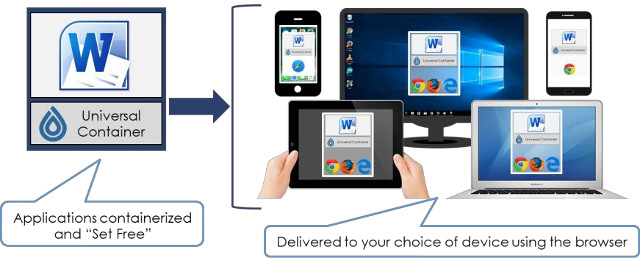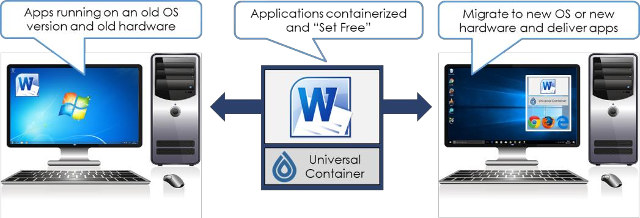The most popular apps are normally ported to all commonly used operating systems such Windows, Mac OS, Linux, Android and iOS, but apps will a lower user base or older apps may not to ported to all operating systems due to the development time / costs involved.
In order to solve this issue, UK based Droplet Computing has introduced Droplet Universal, a patent-pending application container solution that decouples applications from the operating system, and enables applications to run on any device, on- or offline.
 The solution relies on WebAssembly, and allows you to run the app – placed in a low footprint universal container – from a web browser with Chrome v60 (v62 for Android), Firefox v52, Safari v11, and Edge v16 or greater currently supported. Arm and x86 platform are supported, although it’s not yet possible to run Arm apps on x86 with Droplet Universal.
The solution relies on WebAssembly, and allows you to run the app – placed in a low footprint universal container – from a web browser with Chrome v60 (v62 for Android), Firefox v52, Safari v11, and Edge v16 or greater currently supported. Arm and x86 platform are supported, although it’s not yet possible to run Arm apps on x86 with Droplet Universal.
It’s hard to know how well this works without testing it, but we may have a clue as Droplet relies on the open source WINE project for loading x86 Windows applications, and based on my past experience with WINE, I’m not convinced it will be a reliable solution with that many apps/programs. The company however claims that since the app runs natively, features such as printing, saving documents, or your connection to a network will work without change.
 If Universal Container can be made to work reasonably well, they could have a serious impact, as for example it could become possibly to develop an app for a single operating system (or maybe make one mobile and one desktop version), and run it on any devices, slashing development costs.
If Universal Container can be made to work reasonably well, they could have a serious impact, as for example it could become possibly to develop an app for a single operating system (or maybe make one mobile and one desktop version), and run it on any devices, slashing development costs.
I’ve also read some companies are still running Windows XP because they developed a specific program a while ago, and porting it to a more recent (and secure) version of Windows would be too costly. Universal Container would be the ideal solution to solve this type of issues. This would also bring Windows programs to Chromebooks for example, provided there’s enough memory…
You can find out more by watching the 2-hour presentation on Facebook (the actual presentation and audio starts at the 6:26 mark), and/or visiting Droplet Computing website. The company is now targeting businesses for now as the short promo video makes clear, but they’ll soon launch Droplet Computing Personal Edition for individuals.
Via About Chromebooks, ChromeUnboxed, and Liliputing

Jean-Luc started CNX Software in 2010 as a part-time endeavor, before quitting his job as a software engineering manager, and starting to write daily news, and reviews full time later in 2011.
Support CNX Software! Donate via cryptocurrencies, become a Patron on Patreon, or purchase goods on Amazon or Aliexpress





“a patent-pending application container solution”
Welcome to software patents, which should be invalid in the US and in Europe.
Depends on the context and nature of the SW Patent Application.
The LZ compression patent, for example, is still patentable now after the Supreme Court Decisions.
Most algorithms…you’d be right. Just some of them will be patentable. If I had real money, I’d resume my patent application that had to be set to one side a while back- it’s in the class that’s still eligible, but it’s not fully “software”. It can be done in either and the embodiment I have to show the USPTO is in software right at this time. I can get a hardware one now, thanks to CLaSH and SpinalHDL.
Oh, we’re going for THAT now. This is like having a generic emulator on each of these targets as a runtime.
Didn’t we learn anything from P-Code or Java?
You can watch this technology in action here. https://youtu.be/JK3aLVI0m1U
next wheel-like invention – seems like they never googled about opensource cordova/crosswalk frameworks. running the same code is half of problem here – the main part is the stable fast multiplatform h/w access (buttons, gps, audio, camera, USB ports, etc.)
another piece of bullshit from Britain .. “patent pending universal container ” – LOL